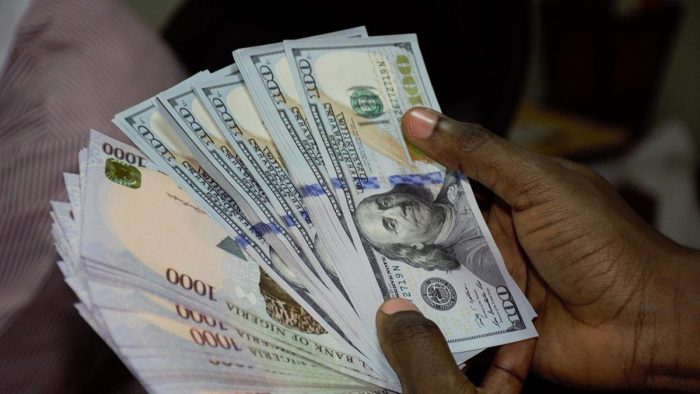…As market sees local petrol refining, EFEMS, inflows effect
The naira appreciated to an eighth-month high of 1474.78/$ at the official foreign exchange (FX) market on Friday as dollar demand eases on a raft of fiscal and monetary policies of the government.
The naira traded at 1,485.99/$ on June 3, 2024 at Nigerian Foreign Exchange Market (NFEM). However, the currency is now stronger eight months after due to a slew of factors, including a rising local petrol refining capacity, higher dollar inflows and the Central Bank of Nigeria (CBN)’s swift policy actions in the last 17 months.
The 650,000-barrels-per-day Dangote Petroleum Refinery began refining petrol in September 2024, providing premium motor spirit (PMS) to a nation battling an acute fuel crisis.
Read also: Cardoso ties naira’s now seven-month high stability to CBN reforms
Four months after, Nigeria’s petrol imports dropped to their lowest level in eight years. Petrol shipments into the West African nation stood at about 110,000 barrels a day during January 1-24 data compiled by Bloomberg from analytics firm Vortexa Ltd showed.
A PwC document says petrol imports constitute 22 percent-25 percent of Nigeria’s forex demand.
“There is less pressure on the market now because fuel importers are no more seeking dollars to import petrol the way they earlier. More so, the CBN has cleared forex backlog and we saw inflows from Eurobond and dollar bond last year,” Ike Ibeabuchi, emerging markets analyst.
Dollar demand by various sectors of the Nigerian economy, also referred to as foreign exchange (FX) utilisation, fell by 11 percent to $5.7 billion in the third quarter (Q3) of 2024 from $6.4 billion in the second quarter (Q2) of the same year, primarily driven by a reduction in invisible transactions.
Uche Uwaleke, director of the Institute of Capital Market Studies at Nasarawa State University, forecasts a positive trajectory for the naira in 2025, attributing this outlook to lower petrol and food importation as well as increased fuel exports next year.
Uwaleke pointed to the reduced importation of petroleum products as a major driver of the naira rebound.
“With increased domestic refining capacity, we expect a significant decline in fuel imports, which will ease pressure on foreign exchange demand and strengthen the naira,” he said.
He further highlighted the potential impact of increased earnings from the export of petroleum products.
“As Nigeria boosts its export capacity, foreign exchange inflows will improve, supporting the local currency,” Uwaleke noted.
Impact of higher inflows
The foreign exchange inflows recorded in the first quarter of 2024 into Nigeria were about 136 percent of the total inflows recorded in 2023.
In what was considered a landmark transaction, the federal government raised over $900 million from the dollar bond in 2024.
In December 2024, the Nigerian government launched a dual-tranche Eurobond offering under its Global Medium Term Note Programme to finance the country’s 2024 fiscal deficit.
Read also: Naira hits seven-month high of N1,485.95 on CBN policies
The two tranches of the Eurobond were 6.5-year bond with a coupon rate of 10.125 percent and the second tranche, a 10-year bond with a coupon rate of 10.625 percent.
Wale Edun, minister of finance, said: “The first objective is to complete the federal government’s external borrowing programme with the approval of the $2.2 billion financing package, which will include access to the international capital market through a combination of Eurobonds and Sukuk bonds—approximately $1.7 billion from the Eurobond offer and $500 million from Sukuk financing.”
CBN policies
After trading last Thursday, the naira appreciated by 1.67 percent, marking a gain of N24.8 as the dollar was quoted at N1,485.95 compared to N1,510.72 on Wednesday at the NFEM, data from the FMDQ Securities Exchange Limited showed.
Authorised currency dealers quoted the dollar as high as N1,516 and as low as N1,470 per dollar at the NFEM.
The local currency witnessed a 0.9 percent or N15 appreciation at the black market as the dollar was quoted at N1,620 on Friday from N1,635 on Thursday and as against N1,625 quoted on Wednesday.
The CBN introduced the Electronic Foreign Exchange Matching System (EFEMS) in December to bring sanity in the forex market.
The CBN, last Tuesday, also issued a new Foreign Exchange (FX) Code, aimed at enhancing market liquidity, transparency and guiding market participants in Nigeria’s foreign exchange sector.
Read also: Naira rare stability sparks renewed confidence among investors
“I think the whole idea is just to ensure that there is a lot more sanity in the foreign exchange market because those characters have really created a whole lot of problems over the years in the foreign exchange market,” Muda Yusuf, CEO of the Centre for the Promotion of Private Enterprise (CPPE) said .
“For me, I think that is what the CBN is trying to do and the more we’re able to sanitise the markets, I think the more stability it will achieve in the foreign exchange market,” he said.
Join BusinessDay whatsapp Channel, to stay up to date
Open In Whatsapp





